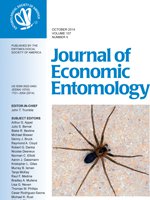Heat stress exerts significant impact on plant—parasite interactions. Phytohormones, such as salicylic acid (SA), play important roles in plant defense against parasite attacks. Here, we studied the impact of a combination of heat stress and exogenous SA on the resistance of wheat (Triticum aestivum L.) plants to the Hessian fly [Mayetiola destructor (Say) ]. We found that the wheat cultivar ‘Molly’, which contains the resistance gene H13, lost resistance to Hessian fly under heat stress (40°C for 3 and 6 h), and that exogenous application of SA on Molly seedlings right before heat stress can partially prevent the loss of resistance of Molly plants under heat conditions. Our findings have significant implications for understanding the dynamics of plant—insect interactions in the context of heat stress.
How to translate text using browser tools
1 October 2014
Exogenous Salicylic Acid Enhances the Resistance of Wheat Seedlings to Hessian Fly (Diptera: Cecidomyiidae) Infestation Under Heat Stress
Joshua Underwood,
John Moch,
Ming-shun Chen,
Lieceng Zhu
ACCESS THE FULL ARTICLE
It is not available for individual sale.
This article is only available to subscribers.
It is not available for individual sale.
It is not available for individual sale.
<
Previous Article
|

Journal of Economic Entomology
Vol. 107 • No. 5
October 2014
Vol. 107 • No. 5
October 2014
heat stress
Hessian fly
resistance
salicylic acid
wheat




